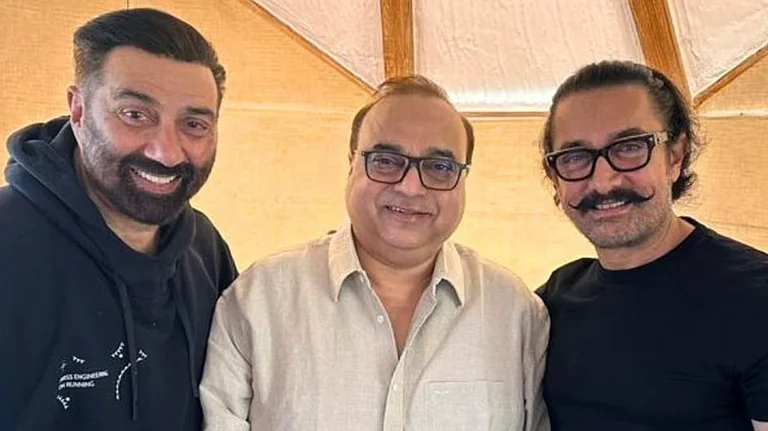THE similarity with the Bollywood graph is ominous. Facing an acute funds crunch, the Telugu film industry has turned to "dubious" sources—arrack contractors of Telengana and coastal Andhra or the rich warlords of Rayalaseema—to finish pet projects. And now the payback time may be around the corner. The November 19 bomb blast at a studio in Jubilee Hills, which left a trail of corpses, was blamed on the Rayalaseema factions and brought to the fore an issue that many in the industry have been reluctant to talk about—the tinsel world-mafia nexus.
According to one estimate, 80-odd films produced in a year are funded by underworld dons, who first chipped in to be part of the glamour that is associated with the film world. Till 1994, about 200 films were produced annually. Then came the slump. Only 100 films rolled out of Hyderabad in 1995; 90 in 1996 and 83 in 1997. Though a concerned state government established a film development corporation to encourage producers, the financial help it extended failed to boost the industry.
The subsidy offered by the Andhra Pradesh State Film Development Corporation is a measly Rs 3 lakh while the production cost of even a small venture is between Rs 50 lakh and Rs 60 lakh. A big film costs about Rs 1 crore. Bigger-budget productions could cost Rs 3 crore to Rs 4 crore with a top billing star like Chiranjeevi charging Rs 1 crore per film. "Dubious" operators have virtually taken over from financier K.L.N. Raju, the sole source of funds in the past.
A depressed film industry finds financial support from the underworld handy for a host of reasons. One, because the financier, who is pumping in black money, may be prepared to write off failure at the box office; moreover, a financier who is attracted to films because of the glamour could be willing to support a production merely because it features a favourite star. The very reason why the Bombay underworld made its first forays into financing films. But as it was later proved, the criminals did not hesitate to claim their pound of flesh from the industry and the wheel turned full circle for the Bombay filmwallahs. Many Hyderabad producers say the mafia's involvement bodes ill for the industry.
While some like noted film producer D. Rama Naidu may brush aside the November blast as just another manifestation of "factional rivalry", which will have no long-term effect on the industry, others are already sounding the alarm bells. The president of the film producers' council and well-known actor-producer-director, Dasari Narayana Rao, has already expressed his fears in a strongly-worded editorial in his film magazine. Chiranjeevi too agrees the blast should not be seen as an isolated incident and that the underworld's involvement in the industry calls for serious examination.
According to producer-director Thammareddy Bharadwaj, the situation could go out of hand if ignored: "A few undesirable elements have made their entry into the Telugu film industry in the recent past, vitiating the atmosphere. In the larger interests of the industry, such elements have to be kept out. Basically, we are peace-loving people in a creative business. Our culture is to make films and nothing else." Though many industry stalwarts consider the underworld's entry a recent phenomenon, veteran filmmaker K.B. Tilak says the "criminal" has always stalked the industry. "Who says this is a new phenomenon? People with shady backgrounds have already taken over the industry. The reason why they flock the industry is because of the showbiz glitz and money. Moreover, they can easily convert their black money to white in this industry."
Tilak rattles off a couple of instances when "dubious" characters have held the film industry to ransom—noted filmstar A.R. Radha once drew out a revolver to shoot MGR; and a junior artiste of the film
Suvarnamala was kidnapped and later murdered. He says even noted artistes like Thyagarayabhagavathulu, N.K. Krishna and Sriramulu Naidu have all had "criminal" links.
But Dasari Rao, who has produced films in Hindi, Tamil and Kan-nada, feels that the scenario has indeed worsened. Voicing fears of
producers, he stresses the need to check the flow of mob money which may finally force genuine financiers to opt out of the industry.
Already, there are quite a few producers with criminal backgrounds associated with the industry. For example, coastal arrack baron Mukku Narasimha Rao, against whom several criminal cases are allegedly pending, is an artiste-cum-producer. Similarly, Rayalaseema faction leaders like Bhuma Nagi Reddy, MP (Telugu Desam Party) and Gangula Prabhakar Reddy (a brother of Gangula Pratap Reddy, MP-Congress), and arrack contractors Srisailam Yadav, Amberpet Shankar and Srinivas Yadav all have criminal links—and a toehold in the film industry, all at once.
According to Tilak, the underworld can only be kept out if there is a change in the attitude of filmmakers. He feels that the present crop of producers and directors is not as committed as his predecessors. "The priorities have changed
over the years. Everyone is out to make a fast buck. Look at the present day films. Sex and violence dominate each one of them," he says. Like Tilak, many in the industry feel that it's time the Centre recognised filmdom as an industry.
Because only then can filmmakers turn to banks for finance. Otherwise, the underworld from Telengana—and its big bucks—will soon spread its tentacles over the Telugu film industry and script a Bollywood-like gory future.






















